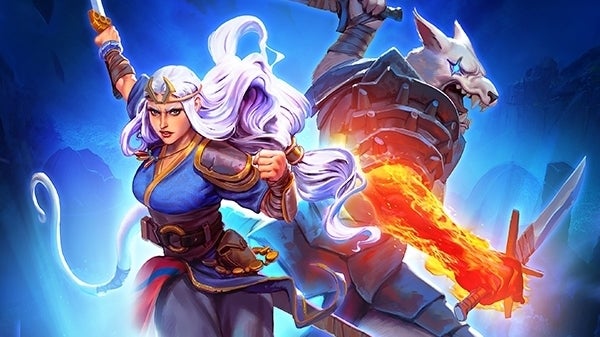There’s a confidence to Roguebook I really like, which I suppose I should expect from a new game by Magic: The Gathering creator Richard Garfield. It’s not just in the presentation of the game, though that certainly helps – it’s crisp and clear and colourful and characterful – but in the brand of strategy it offers underneath. This is a game made of familiar components and yet it feels satisfyingly new.
Roguebook previewDeveloper: AbrakamPublisher: NaconPlatform: Played on PCAvailability: Releasing 24th June on PC (with a free Steam demo available until 9th Feb), and coming to PS4, Xbox One and Switch at a later date.
The overwhelming inspiration is Slay the Spire, that much is obvious. Not only is it a Roguelike deckbuilder, it goes as far as to copy the Strike and Defend cards in your opening deck. But I think we can probably consider Slay a template for the genre at this point anyway, so let’s move on, because it’s in the differences where Roguebook becomes interesting.
In Roguebook, you see, you don’t control one hero but two. And each of these heroes has their own cards that make up your deck. In order for them to attack, you have to play their specific attack card, and the same goes for blocking. However, block is shared between characters, which means whichever character stands at the front, at turn’s end, gets the benefit of the block. This is important, because it’s the character standing at the front who takes damage. Positioning, therefore, is vital.
You don’t want to strand your glass cannon at the front. Equally, you can’t hide them in the back. Certain attacks move them forward automatically, you see, and others can only be used from the front. Therefore, you swap – you constantly swap. And everything ties into this. There’s an upgrade you can apply, literally called combo, that makes a card cost one less energy (you begin with three each round) as long as the other character used an ability first. Do you see? Swip-swapping in combat is where the real skill lies.
The other skill comes in exploration, which I didn’t expect but I’m quite taken with. Exploration is a kind of puzzle, and comes from the world being a partially-filled-in map. The only filled-in route is a short and direct one, from level-beginning to boss-battle end, the A to B. Everything else is hidden and it’s up to you to reveal it, if you can. And you will want to, because out there are all kinds of things to improve your chances of winning with: money, opportunities to buy cards, gems to upgrade cards with, alchemists to transmute cards with, and so on.
